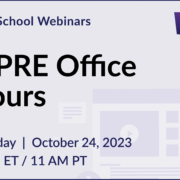Five Important Steps If You Failed the MPRE
Five Important Steps If You Failed the MPRE
Are you wondering how to change your approach to studying for the Multistate Professional Responsibility Exam (MPRE) in order to pass the exam? Below we provide you with five steps to take if you failed the MRPE.
Five Important Steps If You Failed the MPRE
1. Start reviewing the Model Rules of Professional Conduct earlier.
One of the most common things we hear from students is that other law students told them that the MPRE is an easy exam that does not require a lot of preparation. This could not be further from the truth!
The National Conference of Bar Examiners designs the MPRE questions. This is the same entity that designs Multistate Bar Examination (MBE) questions for the bar exam, which are known to be challenging! Do not underestimate the MPRE. Begin reviewing for the MPRE about a month before the exam (rather than the week or weekend before)!
One of the first steps to take if you failed the MPRE is to put together a study schedule so you can plan exactly when you will begin your review. Here is our free MPRE sample study schedule.
2. Read, memorize and understand the Model Rules.
Make sure you are using a good outline to review the Model Rules. We have a fantastic free outline and MPRE course to help you tackle the Rules. We strongly recommend that you review all of the Rules, but if you are truly strapped for time, begin with those sections that are the most highly tested (e.g., conflicts of interest, the lawyer-client relationship, and litigation and other forms of advocacy). Then move on to reviewing the next tier of frequently tested Rules.
Consult the NCBE’s MPRE Subject Matter Outline to understand which areas are more highly tested. Focus on those, as well as the exceptions to the rules!
Additionally, be sure to read the Rules and questions carefully. Many questions ask test-takers when a lawyer must take particular action versus when a lawyer may take a particular action. (For example, many students are surprised to learn that all of the exceptions to the duty of confidentiality are permissive!) These nuances are easy to miss but incredibly important to understand.
Lastly, pay close attention to the lawyer’s requisite state of mind when reviewing the Rules. For example, does the lawyer need to know or reasonably believe the information to trigger the requirements of a particular rule? Thus, the next step to take if you failed the MPRE is to memorize and understand the Model Rules.
3. Familiarize yourself with the examples in the comments to the Model Rules.
Students often do not realize that a number of the fact patterns on the MPRE are derived from the comments to the Model Rules. If you find that you are getting tripped up on certain Rules or sections, review the comments to those Model Rules online and take notes on the concrete examples that are provided. The comments give further guidance on how to interpret the Model Rules, which is invaluable! This is a crucial step you can take if you failed the MPRE!
You can find the Model Rules and the corresponding comments on the American Bar Association’s website for free.
4. Review actual released MPRE questions from the NCBE.
The best way to review is to practice with the real questions released by the NCBE. The NCBE has released 15 sample questions for free. In addition, the NCBE has released two 60-question exams. Only the most recent exam is available for purchase on the NCBE site (for $45). However, we offer both NCBE exams for purchase for $69.99. We strongly recommend completing the two exams under timed conditions after you have had a chance to review and memorize the Rules. This will help you figure out whether you have any timing issues.
Here are some suggestions for free MPRE practice questions.
5. Answer practice questions slowly and methodically.
Many students race through MPRE practice and do not enough time to review their completed questions. As you are practicing, do one question at a time. Then review the explanation for that question to make sure that you understand why a particular choice was correct and the other three were incorrect. Write out the rule for the question for the questions that you answer incorrectly (or guess on!). Sometimes it may be helpful to jot down the key parts of the fact pattern in your own words to help you remember how a rule was tested. Incorporate these rules into your memorization each week – this will help you turn your weaknesses into strengths!
We hope you found our five steps to take if you failed the MPRE helpful!
Looking to Ace the MPRE?
- Enroll in our 5-star rated free MPRE Course, complete with expert guidance, an exclusive outline, practice questions, and a one-sheet.
- Tackle the Real MPRE questions — the gold standard for test preparation.
- Elevate your preparation with personalized MPRE private tutoring, featuring a tailored study plan and dedicated MPRE outline.
- Dive into our assortment of complimentary top-notch MPRE resources for your success.







Leave a Reply
Want to join the discussion?Feel free to contribute!